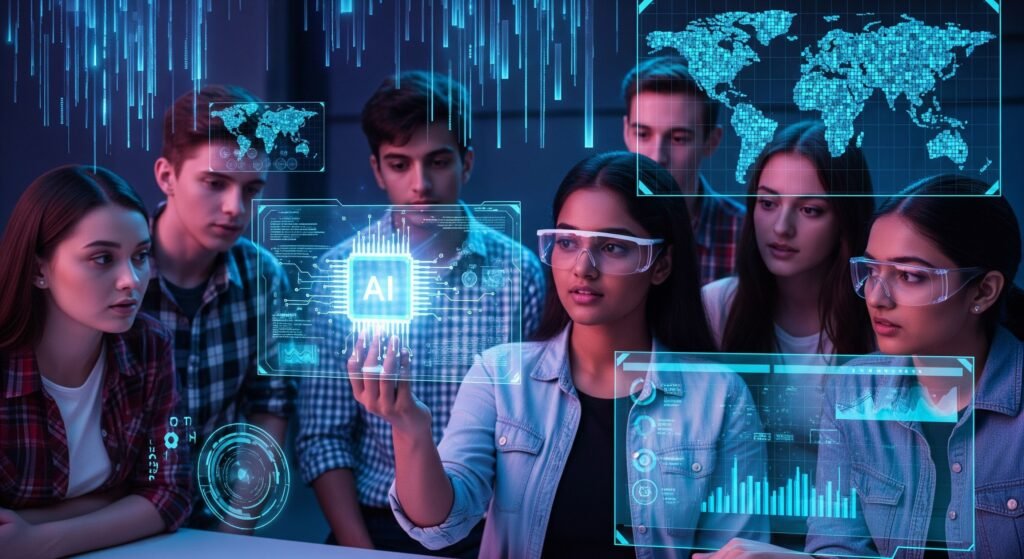
The artificial intelligence revolution is no longer a distant possibility. It’s happening now, fundamentally altering how we work, the skills we need, and who gets hired. With AI-related job postings skyrocketing and traditional roles evolving at breakneck speed, both students and professionals face an urgent question: how do we prepare for a future where our jobs are changing faster than ever before?
The great skills shift: When 70% of your job changes
The numbers paint a stark picture of transformation. In an webinar hosted by Microsoft in collaboration with YoutStory, Aditi Jha, Board Director, Head: Legal & Government Affairs, LinkedIn, explained how by 2030, an estimated 70% of the skills required for today’s jobs will be different. This isn’t just about new roles being created. Existing positions are evolving so rapidly that even staying in the same job means continuous learning and adaptation.
The challenge is particularly acute because traditional hiring practices can’t keep pace. Companies seeking AI talent often look for candidates with years of experience in technologies that barely existed a decade ago. This creates a talent gap that’s widening by the day, with demand for AI skills growing at 30% while supply increases at only 16%.
The solution lies in shifting from credential-based to skills-based hiring. Rather than focusing on degrees or years of experience, employers are beginning to prioritize what candidates can actually do. This democratizes opportunity, allowing people from diverse backgrounds to enter AI-related fields based on their capabilities rather than their educational pedigree.
For students and job seekers, this means embracing a mindset of continuous learning. AI literacy is becoming as fundamental as digital literacy was two decades ago. However, the good news is that AI expertise doesn’t require an engineering degree, it’s becoming a general-purpose skill that enhances performance across virtually every sector.
Beyond code: The human skills that AI cannot replace
While technical AI skills are crucial, the most successful professionals in an AI-driven economy will be those who excel at distinctly human capabilities. Communication, leadership, empathy, critical thinking, and strategic reasoning are becoming more valuable, not less, as AI handles routine tasks.
This shift challenges traditional educational approaches, particularly in regions where technical skills have been prioritized over soft skills development. The irony is that as machines become more capable of technical tasks, human skills like creativity, emotional intelligence, and complex problem-solving become the key differentiators in the job market.
Organizations are recognising this trend. In many skills assessments, AI and AI literacy top the list of in-demand capabilities, but the remaining most-wanted skills are almost entirely soft skills. This suggests that the future workforce will need to be hybrid – technically literate enough to work alongside AI systems, but human enough to provide the creativity, judgment, and interpersonal skills that machines cannot replicate.
Building inclusive pathways to AI careers
The AI transformation presents both unprecedented opportunities and a pivotal moment to advance equality. While AI could democratize access to high-value work, it could also exacerbate existing inequalities if access to AI education and skills development remains limited.
Geographic barriers, gender disparities, and socio-economic factors influence who gets to participate in the AI economy. Rural communities, women, and underrepresented groups face particular challenges in accessing AI education and opportunities. Addressing these disparities requires targeted interventions, from improving internet connectivity to creating culturally relevant AI curricula.
The untapped opportunities are particularly high for emerging economies, where large populations of young people need pathways into the digital economy. Success will require coordinated efforts from governments, educational institutions, and private sector organisations to ensure that AI skills development reaches beyond urban centres and traditional tech hubs.
The AI revolution is reshaping not just what we do, but how we think about work itself. Those who thrive will be the ones who can combine technical fluency with human insight, creating value that neither humans nor machines could generate alone.

